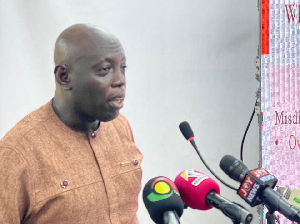 Prof Isaac Boadi, Executive Director of IERPP
Prof Isaac Boadi, Executive Director of IERPP
The Institute of Economic Research and Public Policy (IERPP) has described the 2025 Mid-Year Budget as contradictory, misleading, and technically unsound.
According to the institute, while the government claims there is no need to revise macroeconomic targets, it quietly adjusts revenue and expenditure estimates, an inconsistency that threatens budgetary credibility and public trust.
Speaking at a press conference held on Wednesday, July 30, 2025, Prof Isaac Boadi, Executive Director of IERPP and Dean of the Faculty of Accounting and Finance at the University of Professional Studies, Accra (UPSA), dissected key real sector component of the budget under the theme: “Unpacking Critical Elements of the Government’s 2025 Mid-Year Fiscal Review.”
“The 2025 Mid-Year Budget contradicts itself: it claims no need to revise targets yet adjusts revenue and expenditure. It’s like changing a recipe but expecting the same dish—misleading and technically unsound,” Prof Boadi stated.
Prof Boadi pointed out that the Mid-Year Fiscal Policy Review presented to Parliament on July 24 portrays a picture of economic progress, citing improvements in inflation rates, currency stabilization, and fiscal consolidation. However, he argued that this optimistic framing conceals more troubling realities.
For example, he mentioned that while government revenue and grants have been revised upward by 1.3%, total expenditure has been marginally revised downward from GH¢270.9 billion to GH¢269.5 billion.
According to Prof Boadi, this kind of adjustment, without a corresponding revision of macroeconomic targets, defies budgetary logic and risks undermining public confidence in economic governance.
“If the assumptions underlying budget projections change, logic and prudence demand a corresponding revision of targets,” he emphasized.
He also criticized what he called the selective presentation of fiscal data. Though the finance minister touted a primary surplus and a narrowing fiscal deficit, Prof Boadi argued these achievements are partially the result of deferred expenditures and significant underperformance in oil revenues and grants.
He further noted the dismal performance of arrears clearance and drastic shortfalls in project loan disbursements, raising doubts about the government’s capacity to execute long-term investments.
More concerning, he said, is the government’s continued reliance on short-term domestic borrowing, particularly through treasury bills, which pose rollover risks and threaten fiscal sustainability.
“Ghana’s public debt remains elevated, and the financing gap continues to be bridged primarily through short-term domestic borrowing. This strategy is unsustainable and exposes the economy to rollover risks,” Prof. Boadi warned.
He added that while the government speaks of fiscal discipline, it has instead moved the goalposts in ways that raise questions about transparency and accountability.
“The public deserves transparency, not clever accounting. Ghana’s budgetary credibility hinges not only on numbers but also on consistency between stated intentions and actual fiscal maneuvers,” he further stated.
Dr George Domfe, Senior Research Fellow at the Institute of Economic Research and Public Policy (IERPP) and the Centre for Social Policy Studies (CSPS) at the University of Ghana also cautioned government officials and policymakers against growing optimism over the country’s recent economic performance.
According to Dr Domfe, Ghana’s recent economic successes including a historic trade surplus of $4.98 billion in 2024 and a notable appreciation of the cedi must not lead to complacency.
He noted that while these developments signal short-term relief, deeper structural vulnerabilities persist and must be urgently addressed to prevent a reversal of gains.
“Over-reliance on gold exports, persistent dependence on the International Monetary Fund, and our chronic import addiction remain dangerous pressure points for our economy.
“These are not just economic habits; they are structural risks. Without bold and sustained reforms, the cedi may return to its familiar cycle of depreciation, and Ghana’s fiscal space could once again narrow,” Dr Domfe stated.
AM/MA
Meanwhile, watch as Prophet Worlasi shares bombshell prophesies on Bawumia and NPP on The Lowdown:
